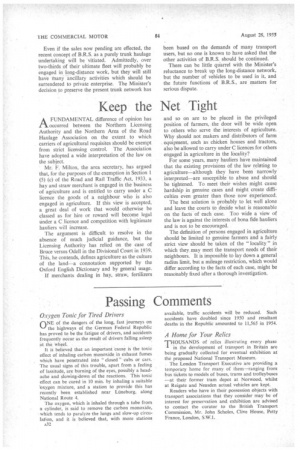Keep the Net Tight
Page 34

If you've noticed an error in this article please click here to report it so we can fix it.
AFUNDAMENTAL difference of opinion has occurred between the Noethern Licensing Authority and the Northern Area of the Road Haulage Association on the extent to which carriers of agricultural requisites should be exempt from strict licensing control. The Association have adopted a wide interpretation of the law on the subject.
Mr. F. Milton, the area secretary, has argued that, for the purposes of the exemption in Section 1 (5) (c) of the Road and Rail Traffic Act, 1933, a hay and straw merchant is engaged in the business of agriculture and is entitled to carry under a C licence the goods of a neighbour who is also engaged in agriculture. If this view is accepted, a great deal of work that would otherwise be classed as for hire or reward will become legal under a C licence and competition with legitimate hauliers will increase.
The argument is difficult to resolve in the absence of much judicial guidance, but the Licensing Authority has relied on the case of Bruce versus Odell in the Divisional Court in 1939. This, he contends, defines agriculture as the culture of the land—a connotation supported by the Oxford English Dictionary and by general usage.
If merchants dealing in hay, straw, fertilizers and so on are to be placed in the privileged position of farmers, the door will be wide open to others who serve the interests of agriculture. Why should not makers and distributors of farm equipment, such as chicken houses and tractors, also be allowed to carry under C licences for others engaged in agriculture in the locality?
For some years, many hauliers have maintained that the existing provisions of the law relating to agriculture—although they have been narrowly interpreted—are susceptible to abuse and should be tightened. To meet their wishes might cause hardship in genuine cases and might create difficulties even greater than those now experienced.
The best solution is probably to let well alone and leave the courts to decide what is reasonable on the facts of each case. Too wide a view of the law is against the interests of bona fide hauliers and is not to be encouraged.
The definition of persons engaged in agriculture should be limited to genuine farmers and a fairly strict view should be taken of the " locality " in which they may meet the transport needs of their neighbours. It is impossible to lay down a general radius limit, but a mileage restriction, which would differ according to the facts of each case, might be reasonably fixed after a thorough investigation.




































































































